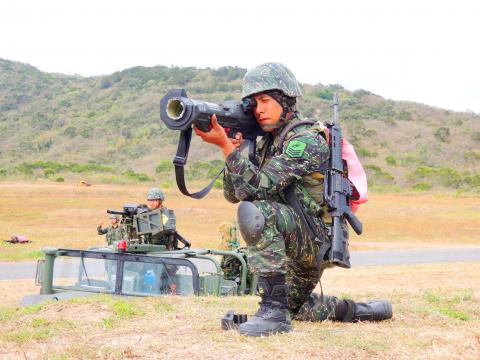Taiwan and the US have sealed a NT$3.8 billion (US$130.5 million) deal for 460 TOW-2B Aero radio frequency (RF)-controlled anti-tank missiles, which are to be delivered to Taiwan annually starting this year, with the final batch to be received by June 2024, a Ministry of National Defense source said yesterday.
The TOW-2B missiles are superior to the TOW-2A missiles the military currently uses in that they are wirelessly controlled rather than wire-guided, the source said.
The RF capability allows the missiles to more easily damage or paralyze enemy tanks by attacking them at more vulnerable points, the source said.

Photo: Lo Tien-bin, Taipei Times
After delivery of the missiles, the army’s anti-tank companies — on both Taiwan proper and its outlying islands — would have priority in deploying the missiles, the source said.
The TOW-2B’s maximum range of 4.5km allows it to be used not only in ground battles, but also to prevent enemy landings by engaging hovercraft and amphibious landing vehicles, the source said.
The sale is part of an arms package announced by the US in December 2015, originally for 769 TOW-2B RF missiles along with training equipment and support systems for a total of US$268 million, the source said.
After assessing the military’s equipment, the ministry elected to purchase 460 missiles due to a healthy number of TOW-2A missiles still in use, the source said.
The move was also a means to incentivize the Chungshan Institute of Science and Technology (CSIST) to make breakthroughs in research and development and produce anti-tank weaponry on a par with the TOW-2B, the source said.
The deal was officially signed by the Taiwanese defense attache and the American Institute in Taiwan, and was promulgated by the ministry on Thursday.
The CSIST is building missiles based on the Kestrel anti-armor rocket and has achieved multiple breakthroughs on key technologies, adding it is possible that the final product could produce an anti-tank missile at the level of the portable F6M-1HB Javelin or the TOW-2B.
The CSIST has also developed a Kestrel variant that can reach targets more than 1,200m away, a drastic improvement over the current Kestrel, which only has a range of 400m, the source said.
The CSIST’s Kestrel variant would be able to penetrate up to 400mm of rolled homogenous armor, which is an improvement on the original Kestrel’s penetration rate of 300mm, the source added.

DAREDEVIL: Honnold said it had always been a dream of his to climb Taipei 101, while a Netflix producer said the skyscraper was ‘a real icon of this country’ US climber Alex Honnold yesterday took on Taiwan’s tallest building, becoming the first person to scale Taipei 101 without a rope, harness or safety net. Hundreds of spectators gathered at the base of the 101-story skyscraper to watch Honnold, 40, embark on his daredevil feat, which was also broadcast live on Netflix. Dressed in a red T-shirt and yellow custom-made climbing shoes, Honnold swiftly moved up the southeast face of the glass and steel building. At one point, he stepped onto a platform midway up to wave down at fans and onlookers who were taking photos. People watching from inside

A Vietnamese migrant worker yesterday won NT$12 million (US$379,627) on a Lunar New Year scratch card in Kaohsiung as part of Taiwan Lottery Co’s (台灣彩券) “NT$12 Million Grand Fortune” (1200萬大吉利) game. The man was the first top-prize winner of the new game launched on Jan. 6 to mark the Lunar New Year. Three Vietnamese migrant workers visited a Taiwan Lottery shop on Xinyue Street in Kaohsiung’s Gangshan District (崗山), a store representative said. The player bought multiple tickets and, after winning nothing, held the final lottery ticket in one hand and rubbed the store’s statue of the Maitreya Buddha’s belly with the other,

‘NATO-PLUS’: ‘Our strategic partners in the Indo-Pacific are facing increasing aggression by the Chinese Communist Party,’ US Representative Rob Wittman said The US House of Representatives on Monday released its version of the Consolidated Appropriations Act, which includes US$1.15 billion to support security cooperation with Taiwan. The omnibus act, covering US$1.2 trillion of spending, allocates US$1 billion for the Taiwan Security Cooperation Initiative, as well as US$150 million for the replacement of defense articles and reimbursement of defense services provided to Taiwan. The fund allocations were based on the US National Defense Authorization Act for fiscal 2026 that was passed by the US Congress last month and authorized up to US$1 billion to the US Defense Security Cooperation Agency in support of the

HIGH-TECH DEAL: Chipmakers that expand in the US would be able to import up to 2.5 times their new capacity with no extra tariffs during an approved construction period Taiwan aims to build a “democratic” high-tech supply chain with the US and form a strategic artificial intelligence (AI) partnership under the new tariffs deal it sealed with Washington last week, Taipei’s top negotiator in the talks said yesterday. US President Donald Trump has pushed Taiwan, a major producer of semiconductors which runs a large trade surplus with the US, to invest more in the US, specifically in chips that power AI. Under the terms of the long-negotiated deal, chipmakers such as Taiwan Semiconductor Manufacturing Co (TSMC, 台積電) that expand US production would incur a lower tariff on semiconductors or related manufacturing